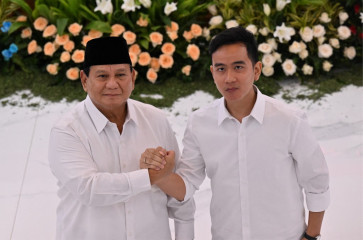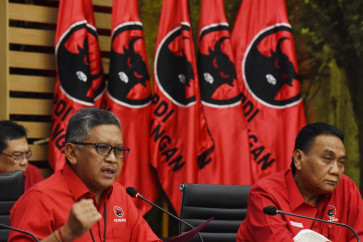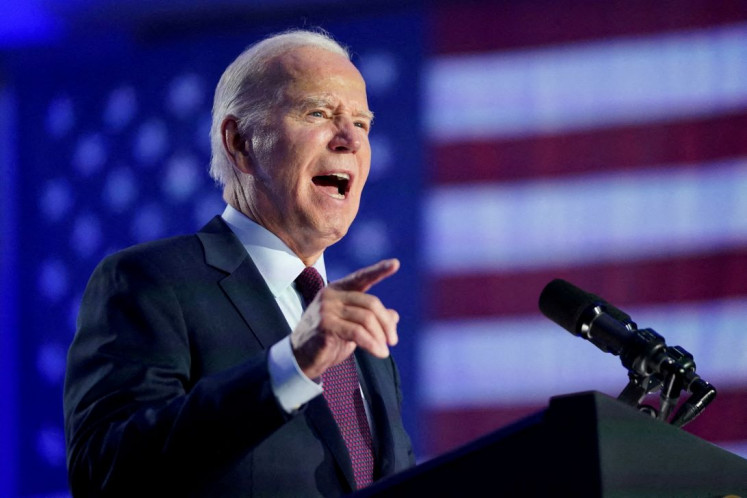Muslims and Hindus living in harmony
The Idul Fitri holidays have always been big for residents of Tegal Linggah village — the largest Muslim village in Buleleng regency, some 20 kilometers west of Singaraja in North Bali
Change Size

T
he Idul Fitri holidays have always been big for residents of Tegal Linggah village — the largest Muslim village in Buleleng regency, some 20 kilometers west of Singaraja in North Bali.
Over the weekend, dozens of local villagers cheerfully celebrated the holidays in their newest and best outfits.
Women cooked traditional delicacies, while children walked happily along the village’s rustic roads to visit nearby relatives.
For hundreds of years, the 4,000 Muslim residents — believed to be the direct descendants of traders from the Bugis ethnic group in South Sulawesi — have lived harmoniously with their Hindu neighbors.
Nyoman Annas, one of the village’s religious leaders, expressed his happiness in welcoming the Idul Fitri holidays.
“Both Muslim and Hindu residents share similar feelings of joy. We will visit each other’s homes to ask forgiveness. We view our Hindu neighbors as our brothers and sisters and likewise.”
The ancestors of the village’s Muslim residents, Annas explained, hail from the seafaring Bugis ethnic group in South Sulawesi.
The community of Bugis people, renown for sailing their distinctive ships across the archipelago since the 15th century, arrived at Buleleng harbor in Singaraja, he added.
Among their ancestors were Fatul Ariffin, Mohammad Abas, Alami and Bawahi.
“They were among the names that we remembered. There were many more,” Annas said.
Singaraja was the capital city of Sunda Kecil Islands comprising of Bali and Nusa Tenggara.
The old city was Bali’s most prominent business center where traders from local and foreign countries, including Middle Eastern countries and China docked their trade ships in Buleleng.
Some traders settled in the city and neighboring villages, establishing uniquely Arabic villages, Bugis villages and Javanese villages.
The king of Buleleng even donated a plot of land for the construction of the area’s oldest mosque in downtown Singaraja.
Unlike the Muslim community in Pegayaman village, the Bugis Muslim residents of Tegal Linggah seemed to be more open to the dynamic changes in the society.
Pegayaman Muslims are the descendants of soldiers from the Javanese Mataram kingdom, Anas said.
They adopted the refined Balinese language as their daily spoken language and adopted Balinese names in front of their Muslim names.
As seafaring traders, Bugis Muslims were more adaptable to the local cultures, adopting the low-Balinese language and more readily mingling with Hindu residents.
A number of unwritten rules exist in Tegal Linggah village — in the selection of village chiefs, both Muslim and Hindu candidates must hold the position of either chief or deputy.
When residents elect a Muslim chief, a Hindu must act as deputy.
“If a Hindu leads the village, then a Muslim must be his deputy,” Anas said.
Muhammad Abu and Hassan Nusi viewed themselves as Balinese Muslims rather than Bugis Muslims.
“We were born in Bali and practice Islam as our religion. Our ancestors might come from Sulawesi, but we really feel we are Balinese because we don’t know about Bugis culture and we do not speak the Bugis language,” Nusi said.
The majority of Tegal Linggah residents work as farmers and traders.
“For hundreds of years, our ancestors lived here side-by-side with Hindu people. Some of them may have even married Hindu men or women,” Abu added.
Despite differences in culture and faith, both Muslims and Hindus in Tegal Linggah village have shown a sense of religious tolerance worthy of praise.
During Idul Fitri, all Muslim families visited their ancestors’ graves, praying for the deceased.
In the afternoon, their houses were opened to welcome their Muslim and Hindu brothers and sisters.









